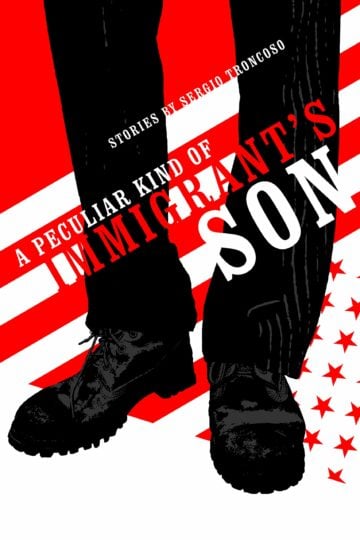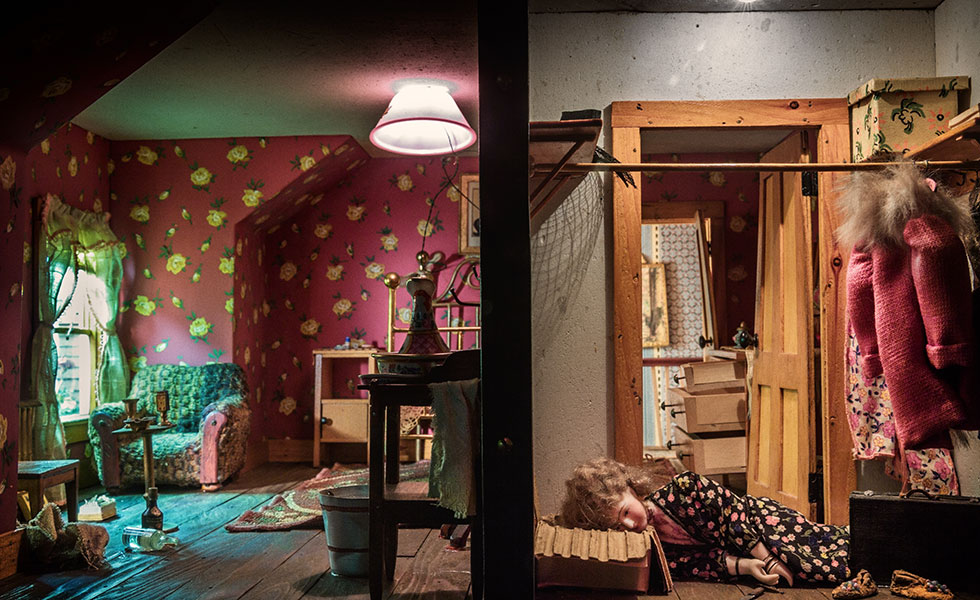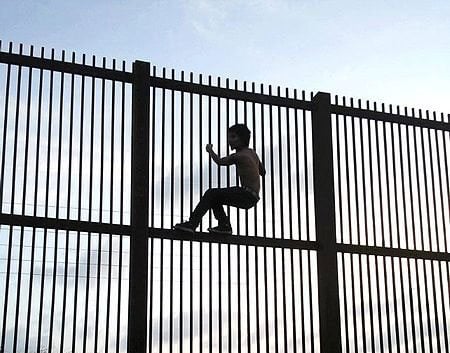
Sergio Troncoso’s New Book Is a Beautiful Meditation on the Borderlands
A Peculiar Kind of Immigrant’s Son reminds readers that the U.S.-Mexico borderlands, so frequently flattened and stereotyped, are as personal as they are political.
In the opening lines of Sergio Troncoso’s new collection of linked short stories, A Peculiar Kind of Immigrant’s Son, our narrator, David, stands in front of a casket struggling to accept that it’s his father inside. David hasn’t been home to his native El Paso neighborhood of Ysleta in years. He has little context for what his father even looks like anymore, and wonders to himself, “These idiots wouldn’t just put anyone in there, would they?” His father’s face is gaunt, wax-like, the patriarch’s trademark “slight smirk now a permanent smile.” When David’s mother bends down to kiss her late husband’s forehead, he wonders if the makeup might flake off, the façade of a peaceful, dignified sleep broken. Everything is distorted. Nothing is what it seems.
From the start, this book takes place not so much at the border of things as on their edge: the contact zones of life and death, past and present, here and there, old and young. In the characters’ minds, we find ourselves on one side of a divide, perpetually looking back or across. With Troncoso, that endeavor is often as dark as it is funny. The El Paso author’s newest collection depicts contemporary Mexican American life with a characteristic blend of sorrow and humor. It’s his most powerful work yet, and an essential addition to the Latinx canon.

By Sergio Troncoso
Cinco Puntos Press
$16.95; 224 pages
Buy the book here.
In this bicultural and occasionally bilingual portrait, the borderlands are more quotidian and less mythic, more human and less geopolitical. Troncoso reminds us that the U.S.-Mexico borderlands, so frequently flattened and stereotyped in the media, are as personal as they are political. Borders in this book are as mental as they are physical spaces, and the fabric of the borderlands proves to be something that follows characters from edge to edge across the Rubicons of life, informing and complicating all kinds of moments.
One of these moments arrives in “New Englander,” when David, now living in rural Connecticut, is working in his shed as he’s attacked by a man brandishing a pistol. In bad shape, he realizes that he must find the mental edge against his aggressor if he stands any chance at survival. Eres demasiado terco, niño, he hears his mother say. You’re too stubborn. He doesn’t go down. And while this mantra—invoked throughout the scene—is almost cloyingly self-congratulatory (and a key into the mythology David has built around himself), it also creates a space for David’s past in Ysleta to echo in the present. What ensues is a meditation on the self as a product of one’s shared history with family and place. And these echoes of the borderlands inform David’s survival instinct, a responsibility to his lineage (and all those who struggled to bring him into being) to not die. “My father. My sons. Can’t give up. Will not,” David says as he limps home.
The book also explores the hard truths of middle age, a kind of borderlands all its own with its various sexual frustrations, weird medications, and attempts to reinvent oneself while figuring out how to stay true to one’s roots. These ideas are salient in Troncoso’s stories that take place in the more patrician settings of this collection—New York and Connecticut—far away from the Ysleta neighborhood that David and other characters have left behind.
The fabric of the borderlands proves to be something that follows characters from edge to edge across the Rubicons of life, informing and complicating all kinds of moments.
Tropes exploring age are especially strong in stories like “Turnaround in the Dark,” set in Iraq, which is the strongest and most compelling story of the collection. In it, Troncoso puts us in the last moments of Army Lieutenant Martinez’s life. He’s a member of the Army reserve working convoy missions between Fallujah and Baghdad, more than half a year into his second tour: “Seven months in Iraq, seven scars on your brain.” He’s returned to the combat zone after being unable to adjust to life back in Ysleta. While his body goes through the motions of a soldier’s job, his mind drifts back home to his wife, Lori, and their son, who sends Martinez hand-drawn pictures of their family back in El Paso, the father looking nothing like him. On some level, Martinez resents himself for being addicted to the soldier’s life, but he wonders if he ever had a choice. Martinez could never really go back to Ysleta even if he tried. He’s changed too much. He considers himself too damaged, a “jittery, jerky bastard,” more useful here than there. It’s only when violence strikes that he finds himself centered. He sees himself as the product of not only his own choices, but also the product of his ancestors’ choices (and those geopolitical events and decisions that exercised outcomes over their lives). Everything, more or less, is a cosmic happening.
It’s fitting, then, that this collection ends with two ghost stories of sorts. One features the legendary true-life figure Carmelita Torres, the “Latina Rosa Parks,” who incited the 1917 Bath Riots in El Paso and Ciudad Juárez. The other includes the fictional abuelita of a character named Vendo on what is, presumably, the day of the dead. In a kind of reverse tradition, she brings him Mexican hot chocolate from the afterworld, glad that Vendo has remembered her but wary of the way he’s trying to find answers in the past. She says to him, “Veni, it’s memories. The past. It carries you backward but also forward, but only so far.”
Read more from the Observer:
-
Mr. Reynolds’ Opus: How Graham Reynolds became Texas’ top composer.
-
Up From the Desert: As a child, I hunted for fossils in the Chihuahuan Desert beyond my backyard. Those afternoons shaped the way I think about my fronteriza identity today.
-
Michael Quinn Sullivan’s Recorded Conversation with Speaker Bonnen Exposes the Texas GOP for What It’s Always Been: The secret recording confirms the cynicism, vindictiveness, and ugliness at the heart of the Republican politics.


